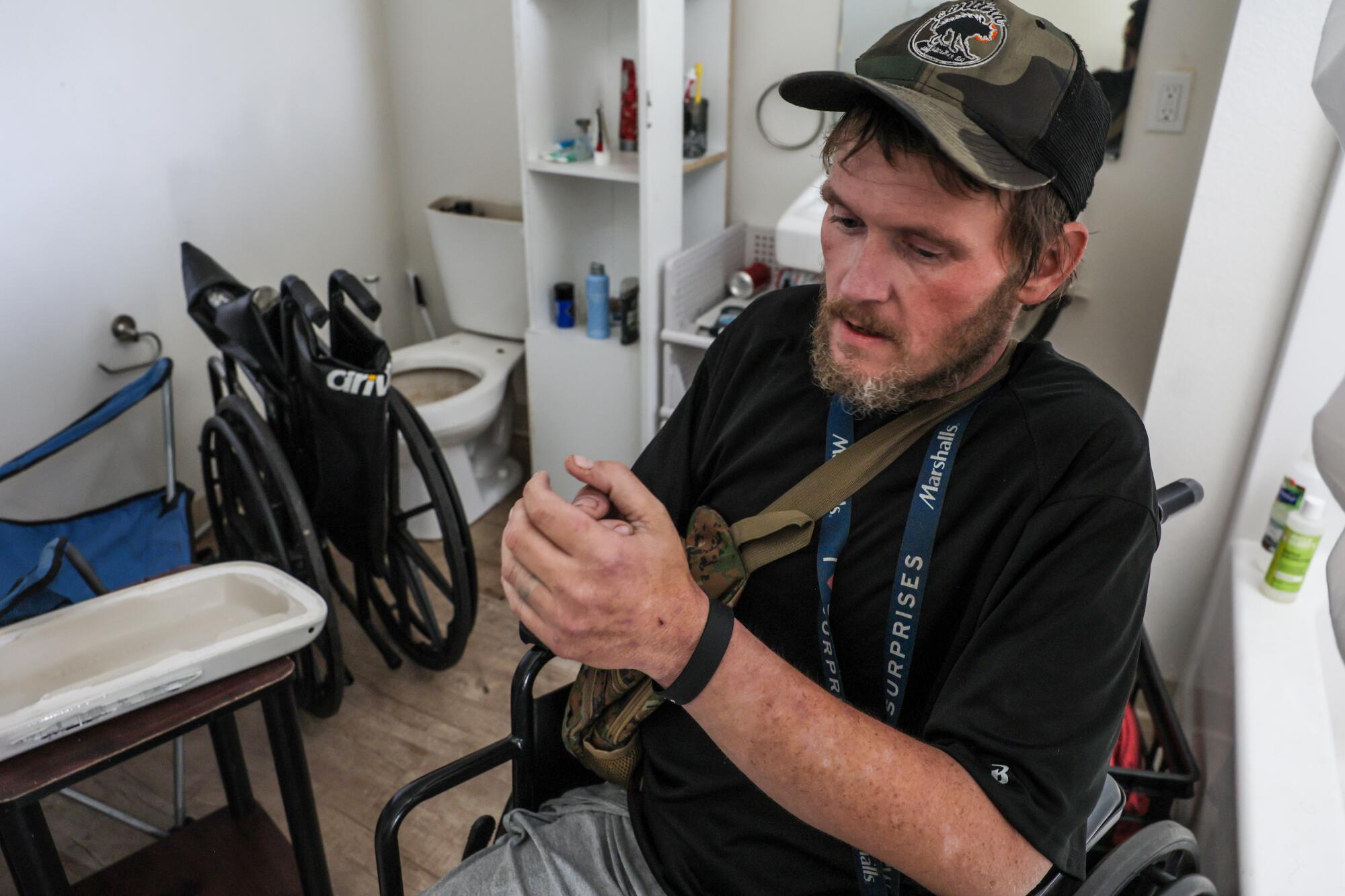
- Share via
At the corner of 7th and Witmer streets, not far from downtown Los Angeles, stands a gray-and-orange six-story building that was meant to serve as permanent supportive housing for formerly homeless people.
But for many tenants who long dreamed of moving off the streets and into their own apartment, the property has become a horror show.
In a lawsuit filed against current and former owners and property managers of the facility, tenants say the building has fallen into disrepair and lacked security for months at a time, allowing outsiders to wander into the property, resulting in break-ins, drug use and fires in stairwells.

Complaints about a lack of hot water, power outages, roach infestations and mold contamination have gone unanswered, according to tenants. And the only elevator in the building is prone to breaking, in one case for months, stranding several disabled tenants who were forced to rely on neighbors for food and groceries.
One tenant who uses a wheelchair told The Times she had to crawl down the stairs like a child. Another tenant said he suffered a stroke after carrying groceries up six flights of stairs.
And now, after years of complaining, the tenants said they had no choice but to sue the owners and property managers for allowing the building to fall into extreme neglect and disrepair that subjected them to “abysmal living conditions.”
Altadena families say they have been living at a fire-damaged apartment complex without gas or power. A legal consultant for the management company disputed those allegations.
Development of the multimillion-dollar building, which includes studio and one-bedroom units, a central courtyard, outdoor deck and parking for up to 34 vehicles, began in 2014 and was completed in 2020.
The building was celebrated for having obtained a “LEED for Homes” sustainability certification and was the first to implement the use of both stormwater and graywater to supply toilets and irrigation, according to the lawsuit.
The building is funded partially by tenants’ rents and public subsidies from the U.S. Department of Housing and Urban Development and the Los Angeles Department of Health Services, among other sources.
The permanent supportive housing project is meant for people who are experiencing chronic homelessness and have demonstrated a need for housing support.
“The way this property has been run is not only immoral, it’s also a complete betrayal of the public trust,” said Josh Nuni of the People’s Law Project, which represents the tenants in partnership with Capstone Law APC. “The defendants here received millions in public money for a brand-new building and then let it completely fall apart.”
Standing outside the building earlier this week, 48-year-old Nereida Vazquez, a longtime tenant, broke into tears upon receiving a copy of the lawsuit in which she and 23 other current and former tenants are named as plaintiffs.
“All we want is to live a normal life — to have a house and try to live independently and productively like anyone else,” she said, crying.

The lawsuit, filed Wednesday in Los Angeles Superior Court, names as defendants the property owner, 7th and Witmer, as well as previous entities overseeing business operations and managing the 76-unit building.
Among those named are two companies: Decro Witmer and Trillium Property Management. In August, Decro began handling business operations and Trillium began managing the property.
Don’t we all want better for all people who are this impoverished? Los Angeles cannot thrive if there is one community of people safely in homes and another forced onto the sidewalks.
Ted Handel, chief executive of Decro, said he had not seen the lawsuit and could not respond to the allegations made by the tenants.
“If they’re alleging activities prior to September 2024, it was not under our watch,” he said.
Handel, however, acknowledged the building was in disrepair when his company came on board and has been trying to address several issues, including security problems.
Handel said the company had hired a new security firm and installed security cameras but was awaiting approval of city permits to beef up security further.
“We’re taking a number of proactive measures to ensure the safety and security and well-being of the residents, and that is paramount to what we do,” he said.
The lawsuit alleges the companies failed to address a host of problems at the building, including bug and rat infestations. A lack of security, the suit claimed, led to break-ins, thefts and assaults.

“A constantly malfunctioning elevator that at one point was left unrepaired for months, stranding disabled tenants on upper floors and forcing all tenants to walk up and down flights of hazardous, unmaintained stairwells damaged by fires and littered with trash, drug paraphernalia and human feces,” the lawsuit read in part.
The building’s units suffer from severe dampness and moisture accumulation, including under floorboards. That has contributed to mold contamination, according to the suit.
“Defective plumbing with sewage backups and overflows; and brown, contaminated water which has led multiple [tenants] to experience skin infections and irritations with puffy, red, cracked skin and oozing sores, particularly on tenants’ lower limbs,” the suit read.
The lawsuit also claims the companies repeatedly failed to make repairs to the building even when told to do so by inspectors with the Los Angeles Housing Department.
“We’re aware of this location on Witmer [Street],” said Sharon Shadow, a spokesperson for LAHD. “There have been issues at this location, but a new partner came in and has been working to stabilize the property.”
Only one city compliance order remains for the property, a requirement to fix the elevator, Shadow said.
Handel said the elevator has been fixed. But he noted that when the elevator breaks down tenants are temporarily placed in hotels while repairs are being made.
Tenants said they have noticed some recent improvements. They said there are door locks on the emergency doors and the elevator has been fixed. Although they confirm that they have been placed in hotels when the elevator has recently been out of service, they complain that the hotels were not safe and were rampant with prostitution and drug use.
Shana Hauanio, 52, who lives on the third floor of the building, recalls having to crawl down the stairs when the elevator broke down recently, a process that would take her 30 minutes. Sometimes, she said, her 67-year-old boyfriend had to help her climb up the stairs.
“It’s humiliating,” she said.

Andrew Amer, a tenant who uses a wheelchair after the loss of a leg, said he has had to drag his chair up and down five flights of stairs to see a doctor and get groceries.
Richard McLay, 65, who lives on the top floor of the building and uses a cane, said he has fallen a few times on the stairs and has asked friends and neighbors to watch over him as a precaution against further falls.
He said he suffered a stroke two years ago when he returned with groceries to find the elevator was not working and was forced to climb up the stairs several times.
But most recently, he said, he was forced to take the stairs when the elevator was out of service and security did not allow people who deliver meals and medications to come up to his apartment.
“That isn’t right,” he said. “Even my physical therapist, they weren’t letting him come in. I had to go down and get him when the elevator broke.”
Tenants hope the lawsuit will push operators to address other problems at the building.
“Permanent supportive housing is critical, and we need a lot more of it,” Nuni said, “but no one should be forced to live like this. I hope this case puts other permanent supportive housing operators on notice: If you don’t take your basic obligations as a landlord seriously, you are opening yourself up to significant liability.”
More to Read
Sign up for Essential California
The most important California stories and recommendations in your inbox every morning.
You may occasionally receive promotional content from the Los Angeles Times.














